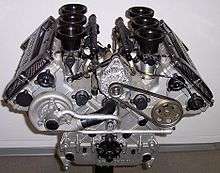Definify.com
Webster 1913 Edition
Engine
En′gine
(ĕn′jĭn)
, Noun.
1.
(Pronounced, in this sense,
ĕn-jēn′
.) Natural capacity; ability; skill.
[Obs.]
A man hath sapiences three,
Memory,
Memory,
engine
, and intellect also. Chaucer.
2.
Anything used to effect a purpose; any device or contrivance; a machine; an agent.
Shak.
You see the ways the fisherman doth take
To catch the fish; what
To catch the fish; what
engines
doth he make? Bunyan.
Their promises, enticements, oaths, tokens, and all these
engines
of lust. Shakespeare
3.
Any instrument by which any effect is produced; especially, an instrument or machine of war or torture.
“Terrible engines of death.” Sir W. Raleigh.
4.
(Mach.)
A compound machine by which any physical power is applied to produce a given physical effect.
Engine driver
, one who manages an engine; specifically, the engineer of a locomotive.
– Engine lathe
. (Mach.)
See under
– Lathe
. Engine tool
, a machine tool.
J. Whitworth.
– Engine turning
(Fine Arts)
, a method of ornamentation by means of a rose engine.
☞ The term engine is more commonly applied to massive machines, or to those giving power, or which produce some difficult result. Engines, as motors, are distinguished according to the source of power, as steam engine, air engine, electro-magnetic engine; or the purpose on account of which the power is applied, as fire engine, pumping engine, locomotive engine; or some peculiarity of construction or operation, as single-acting or double-acting engine, high-pressure or low-pressure engine, condensing engine, etc.
En′gine
,Verb.
T.
1.
To assault with an engine.
[Obs.]
To
engine
and batter our walls. T. Adams.
2.
To equip with an engine; – said especially of steam vessels;
as, vessels are often built by one firm and
. engined
by another3.
(Pronounced, in this sense, [GREEK][GREEK][GREEK][GREEK][GREEK].) To rack; to torture.
[Obs.]
Chaucer.
2.
One who manages as engine, particularly a steam engine; an engine driver.
3.
One who carries through an enterprise by skillful or artful contrivance; an efficient manager.
[Colloq.]
Civil engineer
, a person skilled in the science of civil engineering.
– Military engineer
, one who executes engineering works of a military nature. See under
Engineering
.Webster 1828 Edition
Engine
EN'GINE
,Noun.
1.
In mechanics, a compound machine, or artificial instrument, composed of different parts, and intended to produce some effect by the help of the mechanical powers; as a pump, a windlas, a capstan, a fire engine, a steam engine.2.
A military machine; as a battering ram, &c.3.
Any instrument; that by which any effect is produced. An arrow, a sword, a musket is an engine of death.4.
A machine for throwing water to extinguish fire.5.
Means; any thing used to effect a purpose.6.
An agent for another; usually in an ill sense.Definition 2026
engine
engine
English

An automobile engine
A miniature railway engine
Noun
engine (plural engines)
- A large construction used in warfare, such as a battering ram, catapult etc. [from 14th c.]
- (now archaic) A tool; a utensil or implement. [from 14th c.]
- 1714, Bernard Mandeville, The Fable of the Bees:
- Flattery must be the most powerful Argument that cou'd be used to Human Creatures. Making use of this bewitching Engine, they extoll'd the Excellency of our Nature above other Animals [...].
- 1714, Bernard Mandeville, The Fable of the Bees:
- A complex mechanical device which converts energy into useful motion or physical effects. [from 16th c.]
- A person or group of people which influence a larger group; a driving force. [from 16th c.]
- The part of a car or other vehicle which provides the force for motion, now especially one powered by internal combustion. [from 19th c.]
- A self-powered vehicle, especially a locomotive, used for pulling cars along a track. [from 19th c.]
- (computing) A software or hardware system responsible for a specific technical task (usually with qualifying word). [from 20th c.]
- a graphics engine; a physics engine
- (obsolete) Ingenuity; cunning, trickery, guile. [13th-17th c.]
- (obsolete) The result of cunning; something ingenious, a contrivance; (in negative senses) a plot, a scheme. [13th-18th c.]
- 1590, Edmund Spenser, The Faerie Queene, II.i:
- Therefore this craftie engine he did frame, / Against his praise to stirre vp enmitye [...].
- 1590, Edmund Spenser, The Faerie Queene, II.i:
- (obsolete) Natural talent; genius. [14th-17th c.]
- Anything used to effect a purpose; any device or contrivance; an agent.
- Bunyan
- You see the ways the fisherman doth take / To catch the fish; what engines doth he make?
- Shakespeare
- Their promises, enticements, oaths, tokens, and all these engines of lust.
- Bunyan
Synonyms
Usage notes
In modern usage, an engine is generally considered to be a motor that runs on fuel such as gas, gasoline/petrol, diesel, or kerosene; a motor with some other source of power, such as electricity, is generally not called an engine.
Derived terms
Terms derived from engine
|
Related terms
Terms etymologically related to engine
Translations
mechanical device
|
|
locomotive
|
|
influential group
brain or heart
computer program
Verb
engine (third-person singular simple present engines, present participle engining, simple past and past participle engined)
- (obsolete) To assault with an engine.
- (Can we date this quote?) T. Adams.
- To engine and batter our walls.
- (Can we date this quote?) T. Adams.
- (dated) To equip with an engine; said especially of steam vessels.
- Vessels are often built by one firm and engined by another.
- (obsolete) To rack; to torture.
- (Can we find and add a quotation of Chaucer to this entry?)